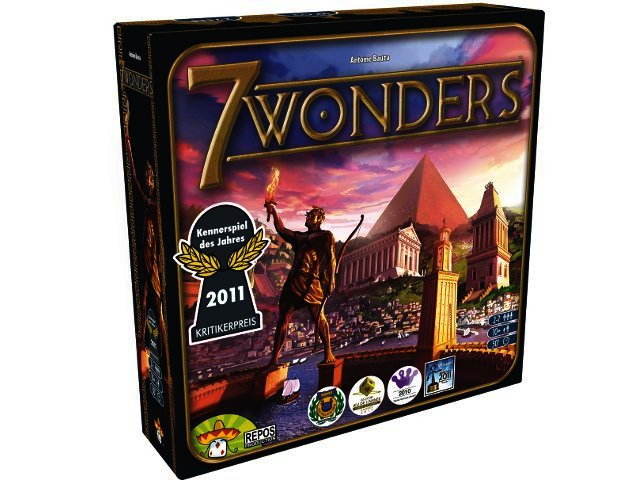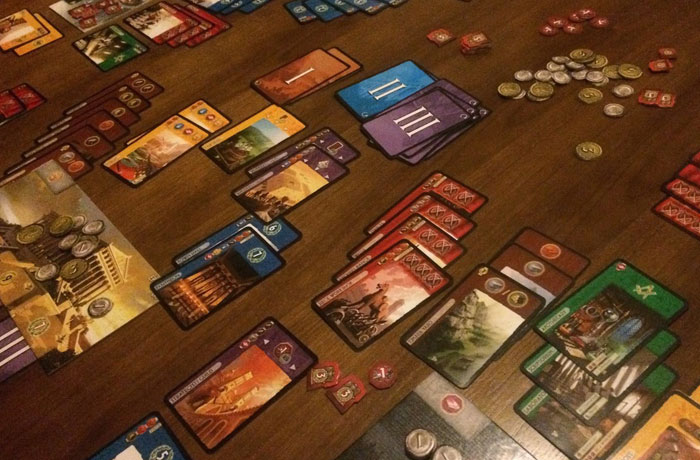7 Wonders review - Table for Six
By Staff Writer 13 February 2015 | Categories: feature articles
Forget digital, sometimes analogue still works best. This is definitely the case when it comes to the growing popularity of boardgames, which forgoes the digital interface, instead opting for a more personal face-to-face approach. The scene in SA is also experiencing a boom, with six Joburg-based friends taking the initiative to start a boardgame blog. Called Table for Six, it’s well worth a gander since you’ll find a number of reviews already published, an SA buyer’s guide providing the best places to shop, and the top boardgame deals for February.
The team at Table for Six kindly agreed that we publish their review for 7 Wonders, a card-based strategy game. For this review and more, head over to Table for Six soonest.
Played: 7 Wonders
7 Wonders is a card-based civilization builder. It is one of the heavier strategy games and one of the top rated strategy games for bigger groups.
The premise:
You are the leader of one of seven great cities of the ancient world. The aim of the game is to gather resources, grow your economy and military, and further science – all with the aim of building a city that will leave a lasting legacy.
How it works:
(This is not a comprehensive ruleset, but aimed to give an impression of the game mechanics).
7 wonders is a card game that happens in three ages, or phases, of the game. Cards are sorted into each age and then distributed evenly between the players. It is a pass and play game and on each turn, you look at your cards, choose one to play and then pass the remainder to your neighbour.

The cards that players have selected must be revealed simultaneously and can be played in one of three ways.
First, you can use the card’s ability: cards in the deck could be used to generate resources (brick, stone, wood, silk, papyrus, etc.), build monuments for victory points (statue, temple, pantheon, etc.), build commercial/ trading avenues to lower the cost of resources, strengthen your military, develop science or, in later phases, build guilds. Each of these actions gives you victory points at the end of the game.

In order to play a card you need to pay its resource cost (resource cards themselves are mostly free). It’s free to put up some buildings, if you built a related card in an earlier age. For example, you can put down a pantheon in the third age for free if you had built a stature in age one or two.
Economic, science, military or guild developments require more resources to build, so building up enough basic resources in the earlier stages of the game, is a key to building the developments you want. However, if you don’t have the resources required, you can purchase them from your neighbour at two gold each.
Second, instead of playing a card, you can also use it to erect one of your three “wonders”. This gives you victory points or free bonuses and upgrades.

Third, you can discard cards to gain three gold, which you might need to purchase resources from your neighbours.
Once all of the cards have been played and passed, the last card is discarded and the age ends. At the end of each age, you get victory points for having greater military strength than your neighbours.
The game then repeats for the second and third age until your entire city is built.
Winning
At the end of the game, you use a score sheet and tally the points from military victory points, economic developments, sets of science cards, wonders, structures, guilds and money. The winner is the player with the most points.
Number of players: 7
Time to play: 60 minutes
Recommended with: 4,5,6,7
Expansions available: Cities, Leaders, Wonders (our group has not played any of these)
BoardGameGeek lifetime ranking: 18
Best place to buy: R650 – Wizards warehouse
Things we like about the game:
7 Wonders won the Kennespiel des Jahres award in 2011 (connoisseurs game of the year) – an award given to the best new strategic game. And it lives up to its hype.
The game requires careful planning and a deep understanding of the cards. For example, if you underinvest in resources early on in the game, you’ll struggle to build bigger developments, but overinvesting is just as bad as resources don’t directly give you victory points.
Also, understanding the cards well enough to know which buildings stack and how many resources you need for your specific development track is critical to winning the game.
This is one of the only shorter strategic games on the market for larger groups. The simultaneous play makes for a really quick game but it is still deep enough to be rewarding.
Things we don’t like:
Those who’ve played the game before and understand how the cards relate to each other will find themselves at a distinct advantage over those who’ve never played before.
Score:
Sameer – 5/5
Faranaaz – 5/5
Nafisa – 4/5
Matt – 4/5
Justin – 4/5
Lisa – 4/5
Team score: 87%

All text and images courtesy of Table for Six. Go visit them today.
Most Read Articles

Have Your Say
What new tech or developments are you most anticipating this year?



